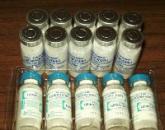Cough in young children without fever. Dry cough in a child without fever. What is dangerous is a strong wet cough in a child without temperature
Unfortunately, children get sick more often than adults. Their immune system is still unable to quickly deal with viruses and bacteria. Therefore, a cough in the first years of life - a phenomenon so familiar that many mothers do not pay attention to him. But this is wrong, as it easily turns into a chronic form, signaling malfunctions in the work of the child’s body, which, without attention, can provoke the development of serious diseases. Although quite often a cough, even prolonged, can have a purely physiological causes.
How to respond
A long cough in a child even without fever may be dry or wet. Dry is usually a sign of irritation or inflammation of the upper respiratory tract. Wet indicates that phlegm continues to accumulate in the lungs or bronchi of the baby. Both types of cough have different causes, and they cannot be treated with the same methods.
Before you begin any treatment for cough, you must carefully observe the baby. Pay special attention to such details:
- the intensity of the cough, its nature (jerky, paroxysmal, single, suffocated, etc.);
- the frequency of its occurrence (how many times a day);
- is there a periodicity, at what time of the day occurs more often
- the amount of sputum, its color, consistency, the presence of traces of blood;
- whether there is a pain sensations in the chest with a deep breath or cough.
The more you tell the doctor about all these symptoms, the more accurately he will be able to make the initial diagnosis and determine what kind of treatment the child needs.
Causes of prolonged cough
If the child continues to cough for some time after suffering a respiratory or broncho-pulmonary disease, then this is most likely a residual cough. He usually does not require special treatment and passes himself a maximum of two weeks.
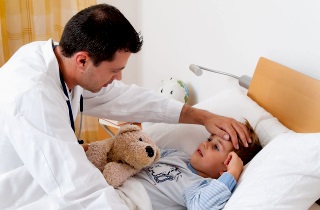 Long-term can be caused by a number of other reasons, presumably to establish which can be based on the nature and color of expectorant sputum:
Long-term can be caused by a number of other reasons, presumably to establish which can be based on the nature and color of expectorant sputum:
And this is only the top 10 reasons for which prolonged cough The child has. Some of them are easily removable. Others require long-term complex treatment. But as is already clear, it should be started with a thorough diagnosis. After all, coughing is only a symptom and it can be completely removed only by eliminating the main reason for its occurrence.
What to do?
 First check all possible noncommunicable causes. Inspect the premises for irritants and allergens. With irritants, of course, easier. But an allergen can be anything, including food or chemical elements contained in paint on clothes or toys of a child. Therefore, if you suspect the allergic nature of cough, but you can not find the culprit, you should consult an allergist.
First check all possible noncommunicable causes. Inspect the premises for irritants and allergens. With irritants, of course, easier. But an allergen can be anything, including food or chemical elements contained in paint on clothes or toys of a child. Therefore, if you suspect the allergic nature of cough, but you can not find the culprit, you should consult an allergist.
About availability chronic diseases the baby usually knows the mother, and the child, as necessary, undergoes a course of preventive therapy, which prevents periods of exacerbation.
But if a child’s cough without fever after a cold or cold does not go a month or more, you need to examine the baby to make sure that, as a complication of the illness, chronic bronchitis or sluggish pneumonia did not develop.
In all other cases, it is advisable to still consult a doctor. Without laboratory tests and comprehensive examination, it is difficult to identify such serious diseases as tuberculosis, cystic fibrosis, chronic infections (mycoplasmosis, chlamydia, etc.). And just the only symptom showing that the child is not in order in these cases is a cough.
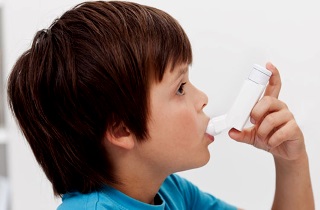 Most chronic and infectious diseases of the respiratory system cannot be cured by any folk remedies. Moms trying to do this just lose time and let the disease go even further. But in time started literate drug treatment leads to full recovery in 90% of cases.
Most chronic and infectious diseases of the respiratory system cannot be cured by any folk remedies. Moms trying to do this just lose time and let the disease go even further. But in time started literate drug treatment leads to full recovery in 90% of cases.
During treatment it is very important to strictly follow all the prescriptions of the doctor and the recommended dosage of drugs.
You should not abandon walks or limit the child to communicate with peers (if he is not sick with tuberculosis). Chronic diseases are usually not dangerous to others, and fresh air and positive emotions are very important for the recovering baby.
The only thing that needs to be avoided so far is too active games, during which a coughing fit can begin. It is also desirable that the child does not shout loudly or sing until the cough has passed completely. The larynx is already irritated, and its overstrain can damage vocal cords. And it is desirable to comply with simple preventive measures that will speed up a full recovery.
Prevention methods
A lingering cough does not appear suddenly in a child. And, like any disease, it is easier to prevent than to cure it. We must take it as a rule - no cough, even a slight cough, does not remain without attention. Prolonged irritation of the larynx over time can transform into such dangerous diseaselike asthma.
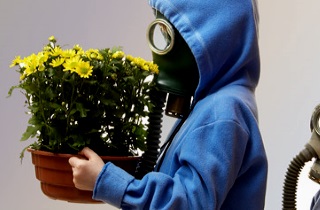 But if the cough has already appeared, and you understand that it has no physiological reasons, it is necessary to act:
But if the cough has already appeared, and you understand that it has no physiological reasons, it is necessary to act:
- establish the cause as soon as possible;
- allergic - identify and eliminate the allergen;
- remove from the room anything that may irritate the mucous throats and nose;
- check the air temperature and humidity (optimally 22 degrees and 60-70%);
- check if there is mold in the apartment;
- make prevention of air conditioning;
- review the diet, remove from it too spicy, salty, "heavy" food;
- if a cold or ARVI is suspected, start treatment immediately.
Perform tempering procedures when a child has prolonged cough, it is impossible in no case, just as giving him intense exercise. First you need to completely cure the baby, and then do all these, of course, useful things.
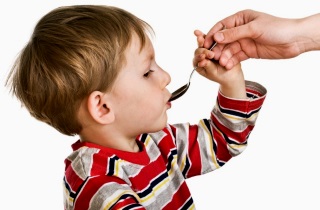 But the use of immunomodulators will benefit him and help to overcome the disease faster. It may be ready pharmaceutical preparations or proven folk remedies, such as rosehip syrup or aloe juice.
But the use of immunomodulators will benefit him and help to overcome the disease faster. It may be ready pharmaceutical preparations or proven folk remedies, such as rosehip syrup or aloe juice.
It is important to remember that it is possible to treat a child with home remedies for no longer than 3-5 days. And if during this time there has not been a clear improvement, the child is naughty, he is not strong, but - your methods are ineffective, and it's time to go for medical help! Lost time faces serious complications, and proper treatment - a guarantee of full and quick recovery.
Often, children develop a cough without fever. It can appear due to various reasons, most often colds, then with the help of a cough the child gets rid of the germs that have accumulated in the throat, chest region. When the cough is accompanied by a fever during a cold or a cold, it says that the body is fully protected from the disease. If the child has a sudden and dry cough, and the body temperature is not elevated, this may indicate other serious illnesses.
Causes of cough without fever
If a child has an infectious, catarrhal disease, which affects the trachea, bronchi, lungs, a cold appears, except for cough, fever, the child weakens. When the disease begins to heal, the symptoms go away. The cough may last another two weeks, then disappears.
If the child has a sudden paroxysmal cough Without a cold, temperature and it can not be cured, you need to carefully examine the child, this is the first symptom of a serious illness.
Most often, such a cough can be a symptom of bronchial asthma, it is aggravated at night, after a hard day. In this situation, it is important to pay attention to how often the child’s asthma attacks are disturbed, how many times a day, a month.
A cough without a temperature in a child can be triggered by an allergic reaction to pollen. different types plants, house dust mites, food, cosmetics, household chemicals, because of this, the bronchi are irritated, become hypersensitive, so children are worried about a strong dry cough. Allergies can be removed with antihistamines, others drugs will be ineffective.
Sometimes, a cough that is not accompanied by fever can talk about an infectious disease - cytomegalovirus, chlamydia, whooping cough, fungi, paracoclosis also often leads to irritation of the bronchi. In some children, the state of health may be aggravated by tuberculosis, but this disease most often occurs along with fever body. In order to accurately know about the disease, the child must pass all laboratory tests, on the basis of their effective treatment will be selected.
Note that if your child starts coughing strongly after a stressful situation, it means that he has a cough because of psychogenic causes, it occurs in the form of attacks, can last a minute, and sometimes the whole day.
It is dangerous to have a cough without fever, which is characteristic of laryngitis, the child suffocates, you must turn to the therapist. In infancy, cough is physiological in nature, with the help of his children clear the respiratory tract from dust, food, which enters the respiratory tract. Sometimes a cough may appear when a child has first teeth.
In cases where the cough is long, not moistened, and no rhinitis is observed, there is a need to have a full course of examination so that the disease does not become chronic with various complications.
Coughing a baby without fever
1. Give your child as much warm water as possible, preferably alkaline. Also, if your child is not allergic, you can give milk with the addition of soda, it is also good to add honey, butter.
2. If the cough is strong, the temperature does not rise, you can hold steam inhalations - they recommend breathing potatoes, which are boiled, you can use different types of herbs - chamomile, sage, eucalyptus.
3. Effective remedy are compresses. So the sputum will be formed faster and the blood circulation in the chest area will improve, you can use honey, boiled potatoes, vegetable oil. It should be placed on the baby’s chest; it should last for at least two hours, best of all, for it to sleep, wrap it up, it should warm up well.
4. Watch the air in the room, it should be wet, give up different types of irritants - the smell of perfume, tobacco, various cosmetic products, household chemicals. Do wet cleaning, wipe the dust.
5. Plentiful drink for the child. It should be diverse, suitable compote, if it is winter, you can use frozen, dried fruits. In season, it is good to prepare fresh fruit compotes, they contain a large amount of vitamins that will help the child recover quickly. Cook cough broths, you can use mother and stepmother, thyme, nettle, thermopsis, oregano. Please note that children with allergies are not allowed to take various herbs, this can only further aggravate the disease and lead to bronchospasm, angioedema, and anaphylactic shock. Cough can be cured with tea with honey and lemon.
Drugs for the treatment of cough without fever
Medications may be prescribed for dry coughing, which will help make it productive, moist. It is effectively treated with the help of Delima, Tusupreksa, Libexina. Please note, you can not get involved in these drugs, they can lead to serious consequences.
If a child moist cough without temperature, it is necessary to reduce sputum, for this the treatment of ACC, Bromhexin, Ambroxol, Mukaltin is suitable. This group of drugs also leads to adverse effects on the child’s body; gastrointestinal tract, liver, children often after nausea, vomiting after taking these funds.
When a child is often sick, you need to think about strengthening his immune system, so accustom him to the sport, he should move as much as possible, play sports, it is important that the food is balanced and rich in vitamins.
So, a cough without fever most often occurs because of an allergic reaction, asthma, less often laryngitis, so you should not start it, you should immediately treat it until it has become chronic, you must complete a full course of examination to confirm the diagnosis.
medportal.su
Dry cough in a child without fever
 Cough, both dry and wet, may indicate a huge number of different diseases in the child’s body. In some situations, this symptom persists for several days, but in most cases takes a protracted nature, and it can be very difficult to get rid of it.
Cough, both dry and wet, may indicate a huge number of different diseases in the child’s body. In some situations, this symptom persists for several days, but in most cases takes a protracted nature, and it can be very difficult to get rid of it.
At the same time, if the baby's body temperature rises further, each mother rightly suspects colds and takes measures to prevent the development of complications after such ailments. If the temperature of the crumbs remains within the normal range, and the cough does not stop, the parents begin to worry and do not know what to do.
In this article, we will tell you about the diseases in which a child can have a dry cough without fever, and what treatment can be prescribed in different situations.
Causes of dry cough without fever in children
This unpleasant symptom in boys and girls in different ages The following reasons may occur:
- In some cases, it is with a slight cough, without increasing the body temperature, various acute respiratory diseases. Often these symptoms also include a sore throat, which causes the child to try to cough. Subsequently, a runny nose may join them, in which case the nature of the cough may change.
- A rare dry cough in a child without fever throughout the day may indicate pulmonary tuberculosis.
- Very often the cause of this phenomenon is an allergy. And, contrary to the generally accepted opinion, coughing in most cases worries the baby not only during contact with the allergen, but much later, when no other allergy symptoms appear. Under such circumstances, the diagnosis of the disease can be difficult, and even doctors for some time do not understand what exactly is happening with the child. In severe cases, allergies take the form of such a disease as bronchial asthmawhich may disturb the baby throughout life.
- After suffering whooping cough, a child often has a dry, paroxysmal cough without fever, which occurs mostly at night. With this disease in nervous system crumbs form a “hotbed of excitement,” which for a long time can provoke this unpleasant symptom.
- Also, the cause of dry cough in a baby at normal body temperature can be contact with volatile substances that irritate the mucous membrane of the upper respiratory tract. Similarly, a small object that has fallen into the respiratory organs can manifest itself.
- Finally, a frequent dry cough in a child with no temperature, more like coughing, may occur in a room with excessively low air humidity. In this case, the cause of coughing is drying of the mucous membranes.
Of course, if your child has a dry cough without a fever, especially long, you should consult a doctor.  To get rid of it unpleasant symptom may apply medicationsdepressing cough reflexHowever, in the treatment of babies, they are used extremely rarely and only as prescribed by the doctor.
To get rid of it unpleasant symptom may apply medicationsdepressing cough reflexHowever, in the treatment of babies, they are used extremely rarely and only as prescribed by the doctor.
In addition, if the cause of dry cough is bronchial asthma, your child may need medications that affect the lumen of the bronchi. Such agents act throughout the body and have a lot of contraindications and side effectsTherefore, they are also absolutely not recommended to be used without prior consultation with a pediatrician.
To alleviate the condition of the baby and speed up its recovery, you need to provide him plenty of drink, as well as the optimum level of humidity in the children's room. All other techniques and procedures can be performed only under the guidance of a doctor.
WomanAdvice.ru
A child has a cough without fever

Coughing is not just a manifestation. catarrhal diseasesThis is a kind of protective reaction of the body to an external irritant. Small children can cough up to 10-15 times a day. This behavior is considered to be absolutely normal if it is not accompanied by symptoms indicating the presence of any disease.
Causes of cough without a child's temperature
The causes of cough without a temperature in children are quite diverse. The cough may be dry or wet.
In children infectious diseases proceed sharply, with pronounced symptoms. An infection that is not completely cured, be it tonsillitis, laryngitis or tracheitis, becomes almost asymptomatic and chronic. This form of disease is accompanied by a sluggish current inflammatory process in the upper respiratory tract. At the same time, a dry cough without fever, runny nose and other attributes indicates an infection. acute inflammation throat
The most serious cause of coughing without a child’s temperature is bronchial asthma, a disease accompanied by swelling of the mucous membranes of the bronchi, asthma and coughing attacks. Congenital asthma occurs in children in the first years of life. The acquired form of the disease is, as a rule, autoimmune.
Adenoids - pathology common among children 3–10 years of age, accompanied by tissue proliferation nasopharyngeal tonsils. Cough with adenoids has some peculiarities:
Not accompanied by fever;
Occurs most often at night;
Has paroxysmal character;
Does not cause complications in the respiratory system of the body.
Dry, choking, coughing small child may be caused by a foreign body entering its airway.
A cough in combination with a runny nose, increased tearing, sneezing, or not accompanied by any additional symptoms, is a manifestation of allergies. The body of the child is particularly active in responding to such irritants as dust, pollen, animal dander. Symptoms of the disease pass on their own within a few hours after the removal of the main allergen.
Oddly enough, but a disease such as helminthiasis can provoke a dry cough without increasing the temperature. Helminths penetrate into various systems of the child's body through the bloodstream, and release toxins into the environment in the course of their vital activity. These toxins are a powerful allergen and provoke symptoms such as dry "barking" cough, weight loss, skin rashes, loss of appetite.
What if a child has a cough without fever
The primary task of parents in the event of a cough without a temperature in a child is to find out what caused this symptom. If it is an allergy, it is necessary as soon as possible to eliminate contact with the allergen of the baby. With strong allergies, an antihistamine will help.
In the absence of third-party symptoms when coughing, you should carefully examine oral cavity child to make sure that there is no foreign object.
The exact cause of coughing without a fever can only be established by a specialist, therefore, when this symptom appears, it is recommended that the child visit the pediatrician as soon as possible.
Eliminating chronic inflammatory processes in the upper respiratory tract helps to strengthen the child's immunity: taking vitamins, immunostimulating drugs, proper rest, proper nutrition.
KakProsto.ru
The child has a barking cough without fever
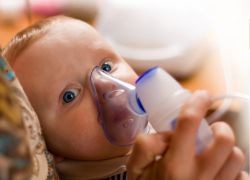 Coughing a baby is always alarming parents, as they are a sign of problems in the children's body. And if a child has a barking cough, but without fever, then it is time to get confused, since it does not look like an ordinary acute respiratory viral infection. Let's find out what can cause such a condition, and what methods of help exist.
Coughing a baby is always alarming parents, as they are a sign of problems in the children's body. And if a child has a barking cough, but without fever, then it is time to get confused, since it does not look like an ordinary acute respiratory viral infection. Let's find out what can cause such a condition, and what methods of help exist.
Common causes of dry barking cough in a child without fever
By barking cough is meant that which occurs without the appearance of sputum. That is, there are no wheezes in the chest as such, and the baby is irritated by the cough center, which can cause a paroxysmal cough.
The fact that a child’s strong barking cough is without fever does not mean that this is not a problem. He can talk about various violations:
- diphtheria or whooping cough disease;
- allergy;
- neurological problems;
- swelling in the throat;
- getting into the respiratory organs of a foreign object.
In addition to the above reasons, cause a rare barking cough in a child without a temperature can just dry and dusty air in the room. This is most often observed in the winter, when the batteries are red-hot and the moisture content in the air necessary for the normal functioning of the respiratory organs drops to a critical point.
Treatment of a child's barking cough without fever

The victim urgently needs a qualified health care. Before that, you can try to hold the baby upside down above the bath, but at this time the helper should tap the breast and back with the edge of his hand. Often, a foreign object, especially a heavy one, with such a procedure falls out, as evidenced by the ringing sound of the bathroom walls.
WomanAdvice.ru
What is dangerous is a strong wet cough in a child without temperature
A moist cough in a child without fever creates many serious concerns for his parents. But often the reason for its appearance is hidden in ordinary dust. Therefore, before therapy you need to find out why the baby has a cough.

Differences wet cough
A baby under the age of two coughs many times a day. Doctors do not see in this phenomenon a serious cause for concern if the overall condition of the child does not deteriorate. But quite often, a cough for no apparent reason indicates a dangerous disease.
There are two types of cough:
- dry;
- wet.
Unlike dry, wet cough can not do without sputum and wheezing. As for the duration, it is acute, protracted or chronic. Therefore, in situations where the cough does not pass for three weeks, it can be protracted. If it could not be cured, after three months it will grow into a chronic form.
The main causes of persistent wet cough are:
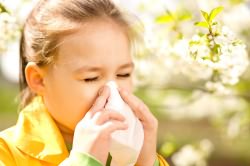
- colds and colds;
- ENT infections;
- tuberculosis;
- allergy;
- whooping cough;
- worm infestation;
- psychogenic factor;
- insufficient air humidity;
- reaction to chemical products;
- hit of a foreign object in the respiratory tract;
- diseases of the digestive system.
Reasons for the appearance of wet cough is really a lot. Therefore, parents need as soon as possible to seek help from a doctor. He will appoint effective method treatment, and the baby will be healthy and cheerful again.
Wet cough as a symptom of the disease
Often at the initial stage of the disease coughing is its only sign. Often it can remain after treatment of ARVI. Rhinitis and painful sensations throat usually pass quickly enough. But the cough is still present for some time, without causing high fever and additional symptoms.
As for sinusitis, rhinitis and other diseases of the upper respiratory tract, the discharge quite often falls into the upper respiratory tract. This is the cause of the attack of wet cough in a baby. To avoid this, you need to treat the child's mouth and throat with an antiseptic. For example, you can make inhalation tincture of chamomile. This procedure will be an effective preventive measure against sore throat.
One of the signs of tuberculosis is frequent cough. In some cases, it is not accompanied. high fever. If the parents have serious suspicions about this, the baby must be shown to a qualified specialist.
 Allergic reactions may manifest on their own, and may be accompanied by other diseases. Sometimes the body reacts to some components with a dry or wet cough. medical preparations. In this case, the child has no fever.
Allergic reactions may manifest on their own, and may be accompanied by other diseases. Sometimes the body reacts to some components with a dry or wet cough. medical preparations. In this case, the child has no fever.
One type of allergy is considered to be bronchial asthma. At the same time, in addition to cough, the baby may experience wheezing, shortness of breath, difficulty in the respiratory process. To establish the stimulus, the child must donate blood for a series of laboratory tests.
As for whooping cough, a prolonged cough without fever may remind you of an illness. In this case, the child has attacks that resemble asthma closer to the night. This phenomenon is usually psychosomatic in nature.
Often, feeling unwell can be caused by a number of emotions and worries that arise in critical situations.
 The children's body with the help of cough expresses anxiety and nervousness. This is especially common at night or during meals.
The children's body with the help of cough expresses anxiety and nervousness. This is especially common at night or during meals.
If the kid is passionate about something, he does not cough during this period. As soon as the child becomes tense, the seizures resume. Sometimes they can not stop for a long time. Naturally, over time, nervousness can retreat itself. But if the child becomes more aggressive, it should be shown to a psychiatrist and a neuropathologist.
Often the cause of coughing can be hidden in the dryness of the air in the room where the baby spends most of the time. To increase the humidity in the room, you must either use a special humidifier, or put containers with water. Such measures will help to calm the mucous membrane of the upper respiratory tract, as well as save the baby from painful sensations.
Often, various chemicals can cause wet cough in a child. If the house is often used aggressive household chemicals, then the baby may suffer from irritation of the mucous membranes. Harmful components various means can get into the respiratory system of the child, so at the time of cleaning it should be sent to fresh air. Upon completion of the cleaning procedures, the entire apartment should be well ventilated, since there is a high risk of chemical poisoning of the baby’s body.
Very often, small children swallow small parts during games. The foreign body gets stuck inside, causing severe irritation of the pharyngeal mucosa. As a rule, in such a situation a sharp coughing attack occurs. In this case, the child must be turned upside down and shaken well. In order for this to happen again, it is necessary to safely hide all small objects. Also, you can not permanently leave the baby alone in the room.
Often, a diseased stomach and biliary ducts cause wet cough have a small child. Since the products of digestion enter the respiratory organs, they begin to cause irritation of the mucous membrane. This may well influence the occurrence of wet cough in a child without fever.
Conclusion on the topic
A dry or wet cough without a baby’s temperature can have many causes. In this case, you can not independently treat the child. Therefore, you need as soon as possible to seek help from a doctor.
Coughing is a natural process, the manifestation of which has the most different reasons. Spasm provokes escape from the respiratory tract foreign bodies and pathogenic microorganisms. However, there are cases when the child has a cough without fever. strong attacks, has a protracted nature, causes unpleasant side effects. Forewarned means armed: let us learn to understand the nature of the phenomenon in question.
When the baby is healthy
It is well known that a child’s cough without fever is physiological and pathological. To free the airways from dust, mucus and other unwanted microparticles, a person should cough 10-15 times a day. Do not worry when there are no:
- nausea;
- dizziness;
- vomiting;
- suffocation;
- chest pain;
- high frequency of recurrences;
- runny nose;
- tearing.
If the baby is cheerful, cheerful, eats well, behaves well, has a healthy sleep and does not have coughing attacks, treatment is not required. Perhaps it is just necessary to carry out wet cleaning more often in the room so that the air temperature is not higher than 20 ° C, and the hygrometer index is 60-70%. It is in this mode that the mucus in the respiratory tract does not harden and departs well.
Spasms in babies
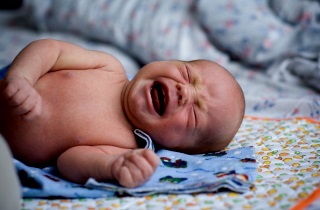 Quite small coughs need to be taken out of the respiratory tract milk, if they choked. Also, babies can literally choke on their tears when crying. This causes reflex spasm. Especially often children suffer from seizures when their teeth are cut. Excessive saliva in the mouth can be the cause of the disturbance.
Quite small coughs need to be taken out of the respiratory tract milk, if they choked. Also, babies can literally choke on their tears when crying. This causes reflex spasm. Especially often children suffer from seizures when their teeth are cut. Excessive saliva in the mouth can be the cause of the disturbance.
These types of cough are the norm for babies. In addition, if you have any additional symptoms in the infant, self-treatment is prohibited. The baby needs to be shown to a pediatrician who will prescribe an effective therapy. The body of the youngest patients is very susceptible to medication, so you need to select and dose them as accurately as possible.
About visits to the doctor
 If a child has frequent severe seizures or additional symptoms (runny nose), he undoubtedly needs qualified help. Only a doctor, setting the clinical picture of the disease, will be able to prescribe a productive treatment.
If a child has frequent severe seizures or additional symptoms (runny nose), he undoubtedly needs qualified help. Only a doctor, setting the clinical picture of the disease, will be able to prescribe a productive treatment.
Pay attention to the frequency and duration of reflex spasms. If they are protracted, disturb sleep and affect the general condition of the child, then this is evidence of pathology in the body. Children's cough, which occurs without an increase in body temperature, sometimes leads to the development of chronic diseases, the manifestation of which is better prevented by timely therapy.
Causes of violation
Diagnose exactly what caused, will help laboratory tests and examination of specialists. It is important to realize that dry cough in children is usually a signal of the presence of the disease that led to its occurrence. Therefore, you need to know the symptoms of such violations:
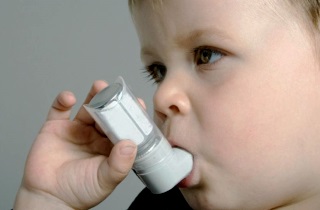
Drug treatment
Successfully cure the disease that caused the spasm is possible only with the help of complex therapy. At the same time it is necessary to influence the elimination of symptoms and pathogens, strengthen the immune system. For these purposes, special preparations are used, among which we can single out the following:
| Group | Titles | Impact mechanism |
| Antitussive | Pakseladin, Omnitus, Sinekod, Codelac. | They act directly on the cough center, they are appointed only in rare cases when there is no other choice, they have many side effects. |
| Antihistamine | "Erius", "Zyrtec", "Suprastin." | "Sleep" the effect of substances in the body that react to allergens. |
| Expectorant | “Bronhikum”, “Gerbion”, “Prospan”, “Licorice root”. | Promote the removal of sputum, make coughing more productive, often produced in the form of syrups. |
| Mucolytics | "ACC", "Flavamed", "Ambrobene". | Thin mucus, make it less thick, which helps to cough better. |
| Antibiotics | Sumamed, Amoxiclav, Amoxicillin. | They kill bacteria, cleaning the body of them, for each child treatment is prescribed individually, because the drugs have side effects. |
| Bronchodilators | Berotek, Salbutamol, Ventolin. | Expand the lumen in the bronchi, facilitating the patient's condition, have a lot side effects and contraindications are selected individually in each case. |
Inhalation
Inhalation helps relieve breathing with the described symptoms. For the procedure, you can use a special nebulizer. The device is equipped with a mask, it turns medicinal solutions or decoctions into microparticles and facilitates their penetration into the infected areas.
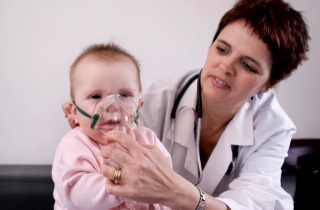 If there is no such device, you can use the old proven method - inhalation of steam. To do this, boil the potatoes in the peel and crush, wait until it cools down a bit, and allow the child to breathe over the pan, covering his head with a thick towel or blanket.
If there is no such device, you can use the old proven method - inhalation of steam. To do this, boil the potatoes in the peel and crush, wait until it cools down a bit, and allow the child to breathe over the pan, covering his head with a thick towel or blanket.
You can also use the fees of various medicinal herbs, excellent recommended in the fight against cough such plants:
- coltsfoot;
- althea root;
- pine buds;
- melissa;
- fruits of dill and fennel;
- thyme;
- lavender;
- calendula;
- flowers of viburnum and raspberry, fruit of the bushes, etc.
Rubbing
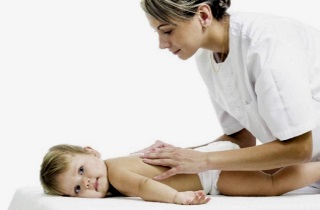 Rubbing is one of the productive means of cough removal. If there is no heat, do not miss the opportunity to alleviate the condition of the patient by rubbing the chest (without affecting the nipples and the heart area), back and feet. For this fit such natural remedies:
Rubbing is one of the productive means of cough removal. If there is no heat, do not miss the opportunity to alleviate the condition of the patient by rubbing the chest (without affecting the nipples and the heart area), back and feet. For this fit such natural remedies:
- butter;
- badger fat;
- bear fat;
- goose fat;
- beef tallow
Rub natural ointments or pharmaceutical preparations with light massage movements to light reddening of the skin, in order to improve the warming effect they dress the patient in warm clothes and wrap him in a blanket. It is best to carry out rubbing at night. For the treatment of young children is not recommended to use alcohol or tinctures on alcohol.
Folk remedies
Traditional medicine also has a considerable arsenal of cough removal recipes. Means are prepared from environmentally friendly and fresh products, only so they can get the maximum benefit. Consider what mixtures cough cures are performed.

be careful
 In order not to harm the health of the child, means against cough, not accompanied by temperature, the doctor sets the dosage and regimen of any other therapy.
In order not to harm the health of the child, means against cough, not accompanied by temperature, the doctor sets the dosage and regimen of any other therapy.
This also applies to drugs and folk remedies. It should be remembered about the danger of long-term use of plant components and animal fats for the health of the child. Even natural decoctions and mixtures can provoke a negative reaction, because an allergy can lead to plant and animal raw materials.
Be careful with components such as honey, milk, alkaline mineral water. They may be completely contraindicated in case of personal intolerance and certain diseases.
Summarize
A spasm of the respiratory tract, which occurs without an increase in body temperature, may be a normal reaction of the child's body to external stimuli or serve as a signal for the presence of a serious disease. Effective treatment will only be in case of compliance with the above recommendations and respect for health. Carefully monitor the condition of the baby, visit the pediatrician on time and are treated with safe means.
Popular
- Breast cancer is curable at any stage.
- The remedy for the cold Sinupret
- Azitrox - official instructions for use
- Chicken-bjaka: allowed antibiotics were found in Russian chicken
- Oral Cancer: Symptoms and Treatment
- Dark and thick blood during menstruation.
- Modern analogues of doxycycline tablets
- Is it possible to die from pneumonia
- What earwax will tell all about your health
- Tussin: instructions for use

